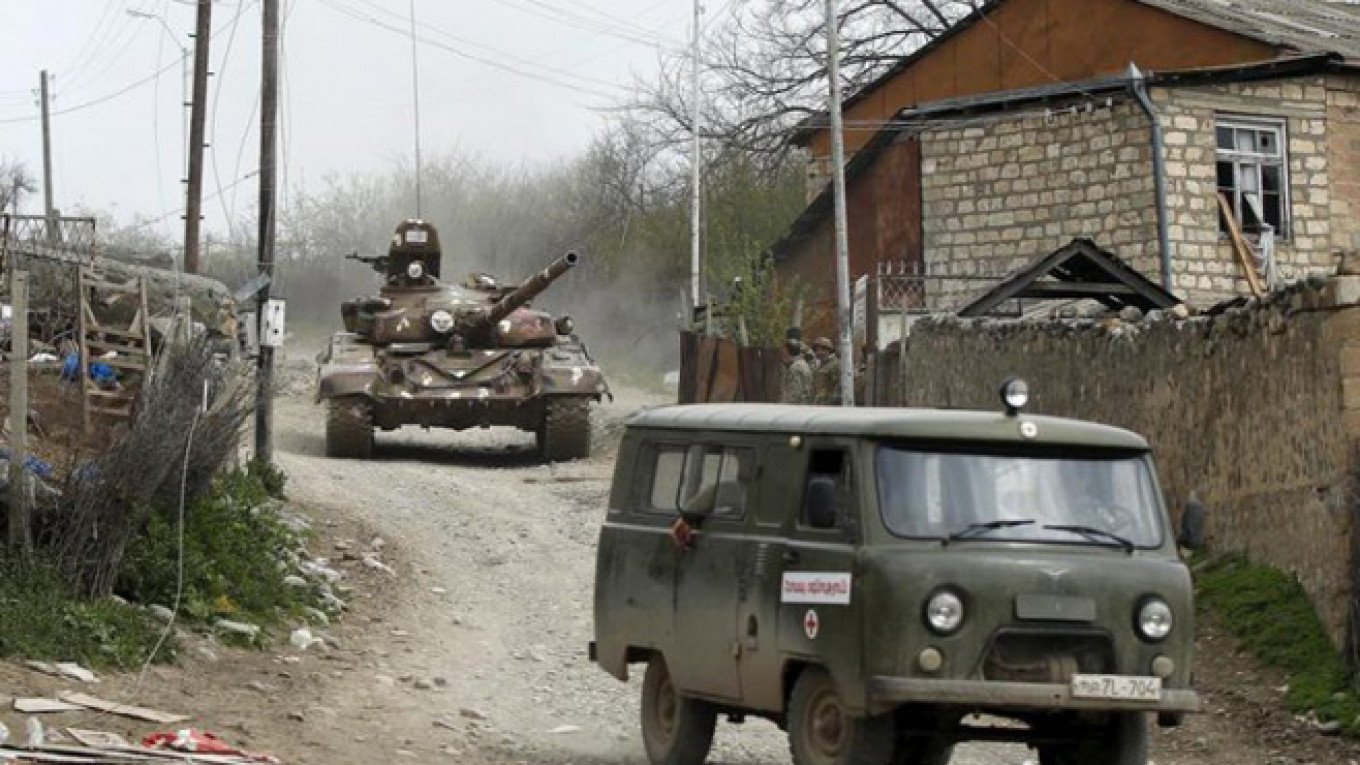
In the early hours of April 2, the long dormant Nagorno-Karabakh conflict erupted as Azeri forces launched a military offensive. The brief, but intense, four-day war revealed the volatility of this so-called "frozen" Karabakh conflict.
From a military perspective, the scale of the Azeri offensive was as unexpected as it was unprecedented. In a well-coordinated attack, Azeri units targeted three different areas along an entrenched and deeply fortified front line separating the Armenian forces of Nagorno-Karabakh from Azerbaijan.
The most serious since the 1994 cease-fire, the clashes demonstrated a new Azeri military strategy, aimed to seize and secure territory by attacking and altering the status quo of an entrenched Armenian defensive perimeter.
Despite a serious counterattack by Armenian defenders, which retook nearly all positions lost in the initial assault, the Azeri side successfully demonstrated an enhanced combat capacity and initially out-gunned the Karabakh defenders. With the purchase and procurement of modern offensive weapon systems, largely from Russia, the recent combat was markedly different than the 1990s war. The conflict's new diplomatic context holds the widest and most serious implications. The Azeri side has reached a tipping point, losing patience for diplomacy and peace talks — preferring the force of arms to resolve the conflict.
The Russian-brokered cessation of recent hostilities reaffirmed the death of the fragile 1994 cease-fire. The oral agreement, reached in Moscow on the fourth and final day of fighting, was an agreement to cease firing, but not a cease-fire agreement.
Looking ahead, the real challenge stems from the imperative to return to basic diplomacy, focusing not on conflict resolution, but on diplomatic engagement to restore calm and rebuild an effective cease-fire.
Such diplomacy is now driven by Russia and backed by its influence. The cessation of hostilities agreement was both announced in Moscow and attained by Moscow. However, as primary arms supplier to both Armenia and Azerbaijan, Russia's role as mediator will be neither easy nor unchallenged.
The challenge for Russia stems not from Western opposition, but from its strategic partner Armenia. Amid a deep and widening crisis in Armenian-Russian relations, Moscow will have to steer carefully and tread delicately. For Yerevan, the crisis represents deepening dissatisfaction — not with the relationship itself, but over the unequal terms of the strategic partnership.
For many Armenians, this crisis marked a culmination in frustration with an asymmetrical and disrespectful alliance, further exacerbated by the sense of betrayal by Russia, which sold the weapons used by Azerbaijan against Karabakh. Russian Prime Minister Dmitry Medvedev only inflamed tensions when, during a visit to Armenia only days after the fighting, reaffirmed Russian plans to continue selling arms to Azerbaijan. Medvedev stressed that this was no longer a simple business transaction, but representative of a new policy of Cold War-style deterrence by seeking to balance both sides with Russian weapons.
This has triggered a new display of diplomatic brinkmanship by Armenia, marked by two distinct demonstrations. The first was of Armenian independence, with the dispatch of senior Armenian military officials to a meeting with NATO, aimed at reminding Moscow that Yerevan has options beyond an institutionalized role as a supplicant state for Russia.
The second Armenian display of diplomatic brinkmanship was far more innovative: the threat to recognize the independence of Nagorno-Karabakh. On May 5 the Armenian Cabinet adopted a motion, calling on Armenia to formally extend diplomatic recognition of Nagorno-Karabakh as an independent republic.
This was a bid to garner leverage and wield diplomatic pressure on mediators as well as Azerbaijan, especially as any such recognition would irrevocably collapse the peace process. Yet, this was also designed to pressure Moscow, which is seen as dangerously shifting away from Yerevan and closer to Baku.
Despite the audacity of this gambit, it remains unlikely that Armenia will recognize Karabakh. Because diplomatic leverage rests on the threat of recognition, Armenian policy remains prudently cautious. With few bargaining chips and limited options in Armenian foreign policy, recognition would only come as a policy response to further and future Azeri aggression.
Nevertheless, the outlook for the Karabakh conflict remains bleak, as the absence of real deterrence means that nothing is preventing Azerbaijan from launching another offensive. This also suggests that as the Karabakh and Armenian forces are the only effective deterrent for renewed hostilities, any future Russian arms sales to Azerbaijan will surely do demonstrable damage to the already strained Armenian-Russian relationship.
Richard Giragosian is a director of the Regional Studies Center (RSC), an independent think tank in Yerevan, Armenia.
A Message from The Moscow Times:
Dear readers,
We are facing unprecedented challenges. Russia's Prosecutor General's Office has designated The Moscow Times as an "undesirable" organization, criminalizing our work and putting our staff at risk of prosecution. This follows our earlier unjust labeling as a "foreign agent."
These actions are direct attempts to silence independent journalism in Russia. The authorities claim our work "discredits the decisions of the Russian leadership." We see things differently: we strive to provide accurate, unbiased reporting on Russia.
We, the journalists of The Moscow Times, refuse to be silenced. But to continue our work, we need your help.
Your support, no matter how small, makes a world of difference. If you can, please support us monthly starting from just $2. It's quick to set up, and every contribution makes a significant impact.
By supporting The Moscow Times, you're defending open, independent journalism in the face of repression. Thank you for standing with us.
Remind me later.






